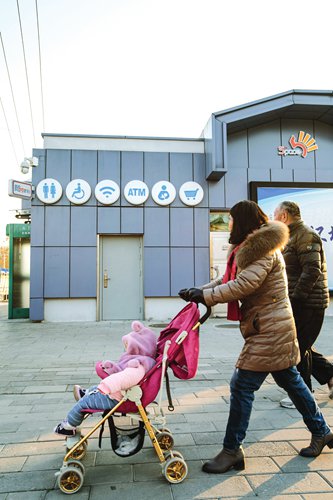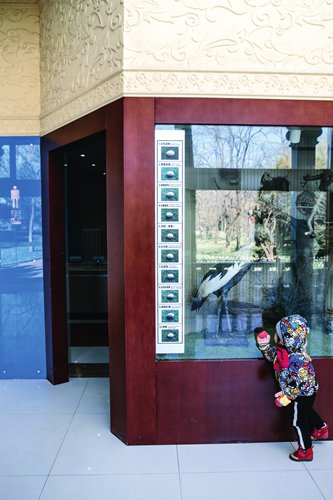
China has installed first-rate public toilets at scenic spots and tourist sites, but squat toilets still rub many foreign visitors the wrong way. Photo: Li Hao/GT
German national Claudia Tiesler was using her only two hours of free time during her three-day business trip to stroll down the famous Nanluoguxiang hutong in Beijing, when nature called. So, she headed to the nearest public toilet.
"It was my first time using a Chinese toilet. I was curious!" she said, recalling what passed through her mind when she opened the heavy military green curtain that separated the hutong lane from the public lavatory.
Public toilets have become a hot topic in both national and international media as China's "toilet revolution" gains traction. The government has called for the continuous upgrade of the country's toilets.
The purpose of the toilet revolution is twofold: to improve the quality of life for China's rural and urban population and to boost tourism, the Xinhua News Agency wrote on Tuesday, November 27.
However, it is a tall order for China, which has the world's biggest toilet market. Making enough toilets available to China's population and tourists has been an ongoing effort since the 1997 Decision on the Sanitation Reform and Development, said University of Science and Technology Beijing researcher Cheng Shikun in a research paper titled Toilet Revolution in China in 2017.
According to Xinhua, China has installed or upgraded 68,000 toilets at tourist sites since the start of its three-year campaign in 2015. Meanwhile, South China Morning Post (SCMP) has reported central government and local authorities' spending more than 1 billion yuan ($152 million) and over 20 billion yuan respectively on public washroom upgrades.
The Bill and Melinda Gates Foundation has also taken part in the toilet revolution, having spent over $160 million on agriculture and public health projects in China, according to a China National Tourism Administration (CNTA) report in 2015.
Beijing ranks third among the top tourist toilets in Chinese cities, a survey conducted by the CNTA in 2015 found. The restrooms at Gubei Water Town, a tourist spot near Beijing and the Great Wall are number one on a list of 10 exemplary toilets in China, according to the CNTA.
But what does the expat community in Beijing think of the toilet revolution?
The Metropolitan talked to expats, international students and business travelers to find out their real sentiment toward China's public toilets, squatting, and the toilet revolution.

The squatting position is more natural for the gut than the sitting position, experts say. Photo: Li Hao/GT
East squats, West sits
Philippe, a French national, has been living and working in China for the past two years. He is glad about the abundance of public restrooms in Beijing.
"They are not perfectly clean, but at least they are there," he said, recalling that Paris planned to build modern public restrooms all over the city some time ago.
"You can still see where you are supposed to find them on the city's tourist website. However, all of them have now vanished," Philippe said.
He said that the existing public toilets in China suit him perfectly fine, and if he wants some additional comfort, he will go to his own home.
When it comes to luxury though, Philippe said he prefers toilets with preheated seats.
"The Japanese toilets with the little water jet cleaning and all," he said.
Like Philippe, the average Westerner likes to sit to do their business, while the average Easterner prefers to squat. This being probably the most prominent cultural difference regarding restrooms, it causes many visitors to China to cringe.
Austrian national David Riley said he always avoids squat toilets when he can.
"I just don't feel like squatting. It's not my type of toilet," said Riley, adding that he did the same when he came across them in Italy as well.
German microbiologist Guilia Enders wrote in her book Gut: The Inside Story of Our Body's Most Underrated Organ that the squatting position is a lot more natural for excretion than sitting because of the closure mechanism in the gut, which opens best while squatting.
"1.2 billion people around the world who squat have almost no incidence of diverticulosis and fewer problems with piles," Enders told the Guardian in an interview.
"We in the West, on the other hand, squeeze our gut tissue until it comes out of our bottoms."
Even though his friends had tried to prepare him for the squat toilets, Nico, a German bachelor's student in Beijing, was still a bit shocked when he saw Chinese public toilets for the first time.
"They are just holes, not actual toilets," he said. "In Europe, I'm used to being able to sit on a toilet and have enough toilet paper to wipe."
John, an international student from England, learned to always bring tissue to public restrooms in China the hard way.
"Once, I used the toilet at the Summer Palace, and afterward, I didn't have any toilet paper. So, I had to resort to using the used toilet paper in the bin," John said.
The reason there is no toilet paper in many public restrooms in China is that people often steal it.
The Temple of Heaven Park in Beijing made headlines when it installed toilet paper dispensers with facial recognition software to combat the problem.
John's dislike of squat toilets comes from the fact that they seldom have toilet paper.
"I don't understand how we are meant to wash or clean up otherwise," he said.
His classmate Otto agrees.
"Not providing toilet rolls is like not providing cutlery in a restaurant," he said.
Nico's reason for avoiding squat toilets is a question of discomfort.
"I have a knee injury from football, so squatting is a bit of a problem for me. I prefer to go home to do my business," he explained.
Nonetheless, he believes that Western-style toilets are dirtier than squat toilets.
"It's not as hygienic as the Chinese ones because you don't have to sit on bacteria infested areas," he said.
John disagrees.
"When I squat, I need to take off my clothes to make sure I don't accidentally do it on my trousers or my shoes," he said.
A barometer for civilized society
Cleanliness is a big issue for many foreigners when it comes to public restrooms in China.
"If something could be improved, I'd say the cleanliness," said Faisel Shehzed, a businessman from Pakistan.
Otherwise, he believes that China's public toilets have the same standards as Western public toilets, "not great, but fine."
Gabriela, Augusto and Rodolfo came to Beijing from Brazil for a one-week seminar, and they had a hard time adjusting to the public toilets.
"To be honest, it's disgusting for us," Rodolfo said. "It's strange for us because it's totally different from what we're used to. I didn't even know how to flush. Was there a flush?"
"I don't know; I don't think so. It seems old-fashioned, and it stinks," answered Augusto.
"It smells really bad, and there was no soap," Gabriela said, adding that squatting hurt her legs.
"And for guys who go to the bathroom, sometimes they miss the spot to pee, so it all goes to the floor," added Rodolfo.
The authorities in China are aware of the problem. They started a campaign titled "Be civil, Be healthy" to promote civilized behavior in public bathrooms.
Signs on the restroom walls advice user to "save water, urinate into the pool, flush in a timely fashion, and protect public property" among other things.
Another issue many foreigners have is privacy. Arvin Kuipers, a longtime expat from the Netherlands, does not like the lack of partitions between individual urinals or squat toilets in some public restrooms.
"My friend lives in a hutong courtyard. When she wants to use the bathroom, she has to leave her house and go to the shared bathroom where neighbors squat right next to one another," Kuipers said.
He said sometimes she would see people casually squatting there, reading a newspaper, smoking, or playing a game on their cell phone.
Restrooms are becoming a real benchmark for economic development and civil sophistication. British public health consultant Ros Stanwell-Smith called them a "barometer of civilization" in his scientific article Public toilets down the drain?
China has installed five-star public toilets at scenic areas and tourist spots such as the Forbidden City to promote a national image of the country as a top tourism destination.
"It will probably prove helpful for tourists who are scared of squat toilets because they might be a bit inaccessible for people who have never seen them before and think they're unsanitary," said John.
Meanwhile, Tiesler was unbothered by her first experience in a Chinese public squat toilet. In fact, she is now officially a fan of squat toilets because she can use them without touching anything
"It was a good experience," Tiesler said. "I am a bike girl, so I have well-trained legs. The only problem was I had soap stuck to my hands, but there was no water."


